23 May 2018 — Geneva
The World Health Organization, UNICEF, and the World Bank Group, in collaboration with the Partnership for Maternal, Newborn & Child Health and the Early Childhood Development Action Network, launched the Nurturing Care Framework for Early Childhood Development during the 71st World Health Assembly, on 23 May 2018.
 The Framework presents a roadmap for action. It builds on state-of-the-art evidence about how early childhood development unfolds and how it can be supported and improved. It focuses on the critical period from pregnancy to age 3 when children are most sensitive to environmental influences. And because of this, it draws special attention to the role that the health sector can play, in collaboration with other sectors.
The Framework presents a roadmap for action. It builds on state-of-the-art evidence about how early childhood development unfolds and how it can be supported and improved. It focuses on the critical period from pregnancy to age 3 when children are most sensitive to environmental influences. And because of this, it draws special attention to the role that the health sector can play, in collaboration with other sectors.
Investing in ECD is one of the best investments a country can make to boost economic growth, promote peaceful and sustainable societies, and eliminate extreme poverty and inequality. In the first years of life, parents, and caregivers are the best providers of Nurturing Care, which is comprised of 5 indivisible components: good health, adequate nutrition, security and safety, responsive caregiving and opportunities for learning. The Framework outlines how policies, information and services can support parents, families, other caregivers and communities in providing nurturing care for young children.
The Framework was launched at an interactive and high-energy side event in Geneva in front of an audience of approximately 200 guests who heard from two panels that included: Dr Michelle Bachelet, PMNCH Board Chair and Former President of the Republic of Chile; Ms Vidhya Ganesh, Deputy Director of Programme Division, UNICEF; Dr Tim Evans, Senior Director Health, Nutrition and Population, the World Bank Group; Dr Nono Simelela, WHO Assistant Director-General, Family, Women, Children and Adolescents; Professor Linda Richter, leading scientist and co-author of the Framework; Dr Abel Kabalo, Director of Health Promotion, Environment and Social Determinants, Ministry of Health, Zambia; Dr B Londoño Soto, Ambassador and former Minister of Health, Colombia; and Mr Steve Davis, Chief Executive Office, PATH.
Watch the launch event
Panelists made the case for investing in the early years, highlighting the importance of creating an enabling environment and emphasizing its importance in ensuring that no child is left behind. Further, country representatives shared their experiences implementing programs to make nurturing care a reality for children, highlighting examples across the five strategic actions promoted by the framework: lead and invest; focus on families and their communities; strengthen services; and monitor progress and use data and innovate.
The WHO’s Director-General, Dr Tedros Adhanom Ghebreyesus, saluted the effort and expressed WHO’s unwavering support to reach every woman and every child.
The session ended by participants taking a moment to reflect on what commitments they could make to promote Nurturing Care and how the partnerships can help them succeed. Public commitments were made by representatives from Bangladesh, Ivory Coast, and the Children’s Investment Fund Foundation.
Soundbites from the panelists
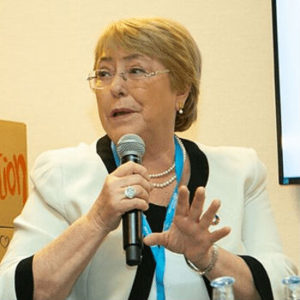 Dr Michelle Bachelet, PMNCH Board Chair and Former President of the Republic of Chile
Dr Michelle Bachelet, PMNCH Board Chair and Former President of the Republic of Chile
“I’m truly a fan of early childhood development because, as mother and paediatrician, I have seen the difference it can make. From pregnancy to the first few years of a child’s life is a critical time to develop the whole potential. I think that it is so important to be able to ensure. The Chile Grows With You programme includes prenatal care, diagnoses of risks, health, nutrition and cognitive development screening with home visits and education to parents on how to be good caregivers, and training to nursery caregivers and school teachers. It also expanded to include caregiver mental health and nonetheless it is not an expensive programme but has been seen to be very impactful on child health and development.”
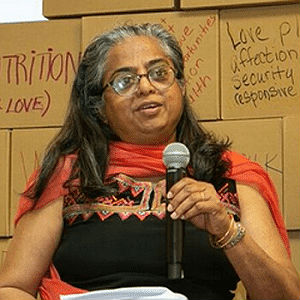
Ms Vidhya Ganesh, Deputy Director of Programme Division, UNICEF
“Care and nurturing is one of the best answers and responses to ensure that children get the best start in life even in fragile and humanitarian setting; even in conflict situations, even when families are refugees or in transition, care, stimulation and support in that age group (0-3) is very critical. In Syria and Afghanistan, we have seen that while the entry point is nutrition, with a little support it can be extend to a broader framework of Nurturing Care. Care at home is also a neglected area. We have the science, we have the evidence, we have the means, there is nothing stopping us from taking these programmes to scale for impact.”
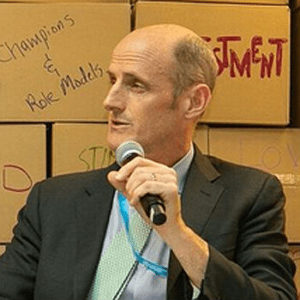 Dr Tim Evans, Senior Director of Health, Nutrition and Population, World Bank Group
Dr Tim Evans, Senior Director of Health, Nutrition and Population, World Bank Group
“The costs of inaction are way too high. ECD is among best buys and the return on investment is huge. It’s a no brainer. 155 million kids are stunted and this is robbing them of cognitive potential. Costs of action are small. Demand and political will is not expensive. But knowledge of what to do and acting on what to do is not a given. The World Bank is trying to create demand by measuring the impact of the failure to invest. 1 dollar invested in ECD gives 7 to 17 dollars return and if you are an investor in any market anywhere, that is a high return. We need shared action; no sector can do this alone which means the burden of implementation is shared. We need to invest in global public good like science and innovation to learn what works and how to make a difference.”
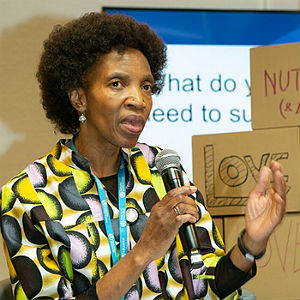 Dr Nono Simelela, WHO Assistant Director-General, Family, Women, Children and Adolescents
Dr Nono Simelela, WHO Assistant Director-General, Family, Women, Children and Adolescents
“When the science converges and the evidence is so well captures and documents and when you have a meeting of Ministers of Health from 194 countries, it is a unique moment. Here we are at this World Health Assembly, we are launching this Framework that is going to change the trajectory in the lives of many, many young people and many, many children and none of us can miss the fact that this is a unique opportunity. It is unique opportunity because we are going to able to apply the lessons and put programmes together that are based on evidence. We hope that Ministers will take the messages in this and make them happen and seize the opportunity to make a difference in the lives of so many children.”
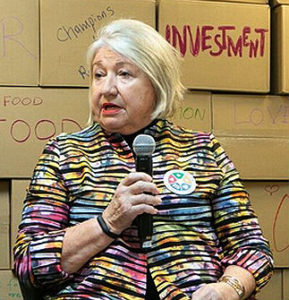 Professor Linda Richter, University of the Witwatersrand
Professor Linda Richter, University of the Witwatersrand
“The ground work of early learning is so incredibly important for adult health, wellbeing and for the future generations of people. The framework is based on incredible advancements in science over the last 15 to 20 years, on how human development happens, the interventions, economics and evaluation of programmes.
We know which experiences are so critical – these are human experience; looking into babies’ eyes, soft and tender voices and calming from the distress activates and organizes the neural development of a child. We know the conditions under which this can break down, for example violence and poverty eat away at the mental and physical health of caregivers and disrupt service provision; these make it very difficult for caregivers to provide nurturing care to children. We have great examples of interventions to correct and compensate for these threats which are most cost effective if given to youngest children. We have learned what the effective ingredients for scale up are; these are political commitment in the form of a statute, or a policy, dedicated budget, building on existing services in health and education and community resources.“
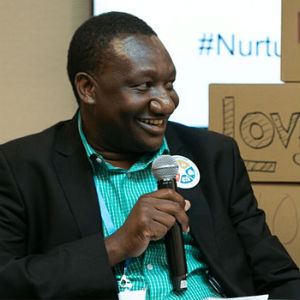 Dr Abel Kabalo, Director for of Health Promotion, Environment and Social Determinants, Zambia
Dr Abel Kabalo, Director for of Health Promotion, Environment and Social Determinants, Zambia
“The small trees that grow, in the future, they make up a forest. For that to happen we need to nurture them, give them water, ensure that their nutritional needs are met so the same applies to our children, they need to be nurtured. We are resolved as a nation to become a middle-income country by 2030 and we are working towards that. We have a national development plan (2017 to 2012) and at the core of that is to ensure no one is left behind. At the core of our investment are our children. We have adopted the Health in All Policies, as the Ministry of health does not produce food, or water and we need a multi-sectoral approach. There is strong political will.“
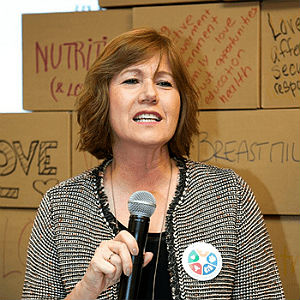 Dr Beatrice Londoño, Ambassador and Former Minister of Health, Colombia
Dr Beatrice Londoño, Ambassador and Former Minister of Health, Colombia
“Nurturing care can’t be led by one ministry or one sector. It requires engagement from the national level all the way to individual communities and families. And we need to evaluate and to keep innovating. As Minister of Health and Social Protection in Colombia, we developed a nurturing care programme called Zero to Forever. In developing this programme, Colombia had the chance to learn from Chile, UNICEF and others who had accumulated knowledge over many years. We learned that the lead shouldn’t be by any one ministry – but rather an intersectoral ministerial group is required with all ministries working as equals; health, planning, finance, education. Also, an alliance is needed with all of society; with private sector and others to make the effort sustainable. Leadership is at the national level, and leadership is needed in families and communities because if they are not involved, institutions cannot substitute what is missed at home.“
 Mr Steve Davis, CEO, PATH
Mr Steve Davis, CEO, PATH
“We see the transformative power of this Framework. We care deeply about any way we can leverage existing capabilities to make a huge difference in the world and to think of leveraging the health systems as an entry point to this important care model is a critical piece of this Framework.“
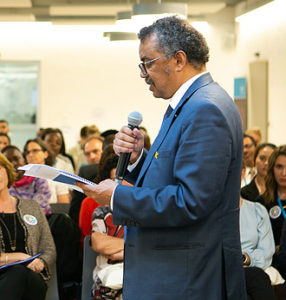 Dr Tedros Adhanom Ghebreyesus, Director General, WHO
Dr Tedros Adhanom Ghebreyesus, Director General, WHO
“Never before has the opportunity of energizing investments in early childhood development been as good as it is now. We have a unique opportunity which is why we need the Nurturing Care Framework to help guide action to ensure that ministries of health are fully engaged in this effort.“





